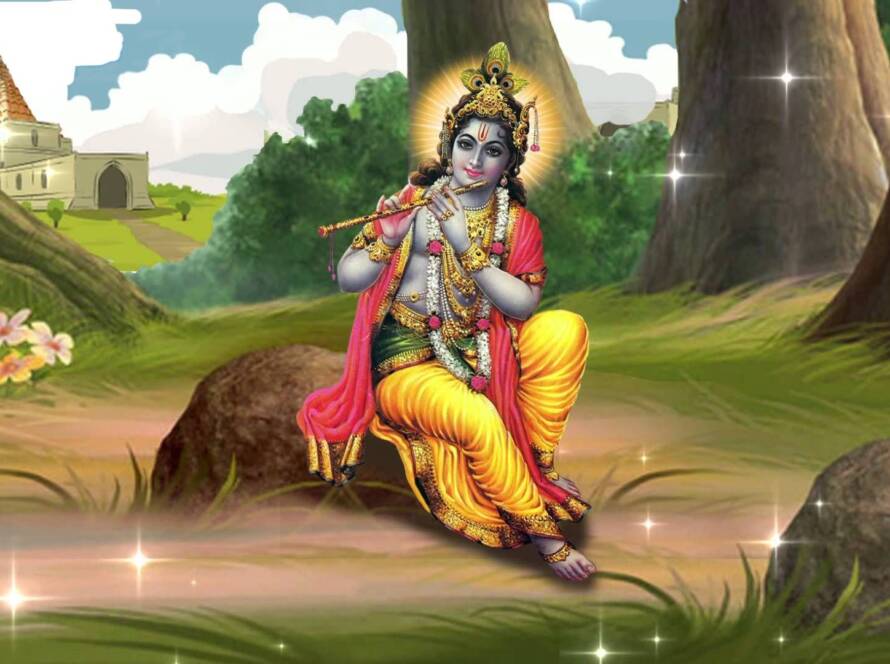Kamika Ekadashi is one of the most significant Ekadashis in the Hindu calendar. It is dedicated to Lord Vishnu, the preserver of the universe. Observing Kamika Ekadashi is believed to cleanse the soul of all sins and bring one closer to the path of salvation. For many devotees, this day is an opportunity to express their devotion and seek the blessings of Lord Vishnu.
Kamika Ekadashi Significance
The significance of Kamika Ekadashi lies in its powerful ability to purify the heart and soul. It is believed that observing a fast on this day can absolve past sins and provide a fresh start on the spiritual journey. According to the scriptures, the benefits of observing Kamika Ekadashi are equivalent to those obtained by performing extensive Yagnas (sacrificial rituals). Likewise every other Ekadashis, this Ekadashi is also potent in destroying negative karmas and granting peace and prosperity. Devotees firmly believe that the blessings received on this day are magnified many times over.
2024 Kamika Ekadashi Date
In 2024, Kamika Ekadashi will be observed on July 31. This date is calculated according to the lunar calendar and falls on the 11th day of the Krishna Paksha (waning phase of the moon) in the month of Shravan. Devotees prepare for this sacred day by marking their calendars well in advance. They ensure all necessary rituals and preparations are completed timely.
Kamika Ekadashi Dates and Times
Fasting
Beginning of Fast: Sunrise on July 31, 2024.
End of Fast: Parana time on August 1, 2024, between 05:23 AM and 07:59 AM.
Parana Time (Breaking the Fast): August 1, 2024, from 05:23 AM to 07:59 AM
Kamika Ekadashi Story
The Kamika Ekadashi story, as narrated in the Brahma Vaivarta Purana, speaks of a brave warrior who committed a grave sin by killing a Brahmin. Stricken by guilt and seeking redemption, he approached a sage for guidance. The sage, understanding his plight, advised him to observe Kamika Ekadashi with utmost devotion. The warrior followed the sage’s advice, fasted, and prayed to Lord Vishnu with a pure heart. As a result, all his sins were washed away, and he attained salvation. This story underscores the immense power and grace of Lord Vishnu and the transformative potential of Kamika Ekadashi.
Spiritual Journey of Kamika Ekadashi
The spiritual journey of Kamika Ekadashi begins with a heartful of devotion and a mind focused on Lord Vishnu. Devotees wake up early in the Brahma Muhurta, to take a holy bath and cleanse themselves physically and spiritually. They then proceed to set up a sacred space for worship, often using a clean and sanctified area in their homes or visiting a nearby temple.
The worship involves offering Lord Vishnu flowers, fruits, incense, and Tulsi leaves, which are particularly dear to him. Devotees chant Vishnu Sahasranama (a thousand names of Lord Vishnu) and other sacred hymns. Reading or listening to the Kamika Ekadashi’s story and other scriptures forms a crucial part of the day’s activities. The fast observed on this day is strict, with some devotees refraining from all food and water, while others may consume only fruits and milk.
Kamika Ekadashi Vrat and Pooja Rituals
Observing the Kamika Ekadashi Vrat is a deeply spiritual practice that involves abstaining from food and, in some cases, water. The fast begins at sunrise on the day of Ekadashi and continues until the next day’s sunrise. Here’s a detailed guide to observing the Kamika Ekadashi Vrat:
1) Preparation:
– Purification: Begin with a ritual bath early in the morning. This symbolizes the cleansing of both the body and soul.
– Setting Intentions: Mentally prepare for the fast by setting a pure and focused intention. This helps in maintaining discipline throughout the day.
2) Types of Fasting:
– Nirjala Vrat: This is the most stringent form, where devotees abstain from both food and water for the entire duration of the fast.
– Phalahar Vrat: In this type, devotees consume only fruits, milk, and water.
– Partial Fast: Some may opt for a partial fast, where they avoid grains and legumes but consume other vegetarian foods.
3) Observances During the Fast:
– Reading Scriptures: Reading or listening to stories and teachings from sacred texts like the Bhagavad Gita and the Bhagavata Purana is encouraged.
– Avoiding Negative Actions: It is essential to refrain from any negative actions or thoughts. This includes avoiding arguments, gossip, and any form of harm.
– Chanting Hare Krishna Mahamantra: In order to please the Supreme God Shri Krishna, it is important that one must chant at least 16 rounds of Shri Hare Krishna Mahamantra, i.e.:
Hare Krishna Hare Krishna Krishna Krishna Hare Hare
Hare Rama Hare Rama Rama Rama Hare Hare
Kamika Ekadashi Pooja Rituals
The Kamika Ekadashi Pooja is an important part of the fast. It involves various rituals and worshipping Lord Vishnu. Here’s a detailed guide to performing the pooja:
1) Altar Setup:
– Clean Space: Choose a clean and quiet space for the altar. Decorate it with fresh flowers and place an idol or image of Lord Vishnu.
– Offerings: Prepare offerings including fruits, flowers, Tulsi leaves, incense, ghee lamps, and sweets.
2) Morning Rituals:
– Sankalp: Take a vow (Sankalp) before beginning the pooja, stating your intention to observe the fast and perform the rituals with devotion.
– Invocation: Begin by invoking Lord Ganesha to remove any obstacles from the pooja.
– Abhishekam: Perform Abhishekam (ritual bathing) of the Vishnu idol with water, milk, honey, and other sanctified liquids.
3) Main Pooja:
– Aarti: Perform aarti by waving lit camphor or ghee lamps in a circular motion before the idol. This is accompanied by the singing of devotional songs or mantras.
– Offerings: Present the prepared offerings to Lord Vishnu. Tulsi leaves are particularly important as they are believed to be very dear to Him.
– Chanting and Recitation: Devotees must chant 16 rounds of Shri Hare Krishna Mahamantra, i.e.
Hare Krishna Hare Krishna Krishna Krishna Hare Hare
Hare Rama Hare Rama Rama Rama Hare Hare
Reading or narrating the Kamika Ekadashi story is also considered highly beneficial.
4) Evening Rituals:
– Aarti: Perform another aarti in the evening, repeating the morning rituals of offering flowers, lighting lamps, and chanting hymns.
– Bhajans and Kirtans: Singing bhajans (devotional songs) and kirtans (call-and-response chants) in praise of Lord Vishnu enhances the spiritual atmosphere.
5) Parana (Breaking the Fast):
– Timely Break: The fast is broken on the following day after performing the morning rituals and offering food to Lord Vishnu. The exact time for breaking the fast, known as Parana, is important and should be done within the prescribed time.
– Food Offering: Offer the first portion of food to Lord Vishnu before consuming it. This is typically a simple meal free of grains and pulses.
Importance of Charity on Ekadashi
Charity, or Daan, holds profound importance on Kamika Ekadashi. It is believed that acts of charity performed on this day bring immense blessings and spiritual merit. The importance of charity on Ekadashi is highlighted in various scriptures, which state that donating to the needy pleases Lord Vishnu. On Kamika Ekadashi, devotees are encouraged to be especially generous, sharing their resources and wealth with those in need.
Bhagavad Gita (Chapter 17, Verse 20)
“दातव्यमिति यद्दानं दीयतेऽनुपकारिणे |
देशे काले च पात्रे च तद्दानं सात्त्विकं स्मृतम् ||”
“dātavyam iti yad dānaṁ dīyate ‘nupakāriṇe
deśe kāle ca pātre ca tad dānaṁ sāttvikaṁ smṛtam”
Meaning: Charity given out of duty, without expectation of return, at the proper time and place, and to a worthy person, is considered to be in the mode of goodness.
Bhagavad Gita (Chapter 18, Verse 5)
“यज्ञदानतपःकर्म न त्याज्यं कार्यमेव तत् |
यज्ञो दानं तपश्चैव पावनानि मनीषिणाम् ||”
“yajña-dāna-tapaḥ-karma na tyājyaṁ kāryam eva tat
yajño dānaṁ tapaś caiva pāvanāni manīṣiṇām”
Meaning: Acts of sacrifice, charity, and penance are not to be given up; they must be performed. Indeed, sacrifice, charity, and penance purify even the great souls.
Things to Donate on Kamika Ekadashi
Specific items are considered particularly auspicious to donate on Kamika Ekadashi.
– Food Donation: items such as rice, grains, fruits, and vegetables are commonly given.
– Clothing: particularly new clothes or blankets, is also a meaningful donation.
– Money: Devotees often donate money or other essential items to temples or directly to those in need.
These donations are believed to enhance the spiritual benefits of the fast and bring divine blessings to the donor.


